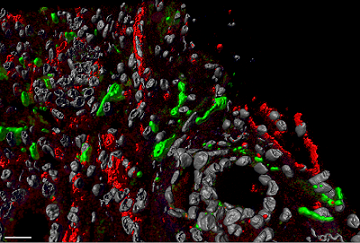Role of the autonomic nervous system in tumorigenesis and metastasis
Convergence of multiple stromal cell types is required to develop a tumorigenic niche that nurtures the initial development of cancer and its dissemination. While the immune and vascular systems have been described as having robust influences on cancer, a growing body of evidences points to the role of the nervous system in promoting cancer development. Recently, our laboratory (IRCM-CEA-UMR967, Science 12 July 2013: Vol. 341 no. 6142 *) uncovered that sympathetic and parasympathetic nerve fibers from the autonomic nervous system (ANS) infiltrate prostate tumors and contribute to the early stages of cancer development as well as tumor invasion and metastasis. Chemical or surgical ablation of sympathetic adrenergic nerves prevents the formation of xenogeneic orthotopic or transgenic prostate tumors. Further, genetic depletion of b2- and b3-adrenergic receptors in the tumor microenvironment alters the transmission of adrenergic signals involved in the early phases of tumor development. In addition, in cancer mice models, the parasympathetic cholinergic signaling has been identified as a key regulator of tumor invasion and metastatic spread, by activation of the type 1 cholinergic muscarinic receptor (Chrm1) expressed in the stroma. Pharmacological and genetic approaches recapitulate the mechanism by which parasympathetic nerves might be able to release acetylcholine in tumor tissues that binds Chrm1 expressing cell targets in the stroma. Magnon’s laboratory at the IRCM is conducting additional studies to further characterize stromal cells and mechanisms involved in controlling cancer-related neurogenesis. Also, understanding biological systems or pathways that might be regulated by the autonomic nervous system in tumors will be pivotal to developing novel cancer therapies.
* commentaires Nature, Cancer Discovery

Adrenergic nerves (green) and vessels (red) in human prostate adenocarcinoma.Tumor epithelial cells (grey)
| Claire MAGNON Research Director INSERM Principal investigator
Phone : +33 (0)1 46 54 93 42
claire.magnon@cea.fr
Secretary Aurélie GOURET Phone : +33 (0)1 46 54 98 66
|